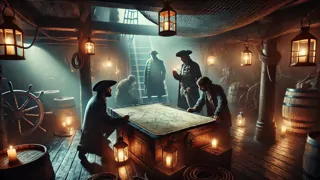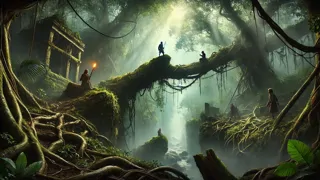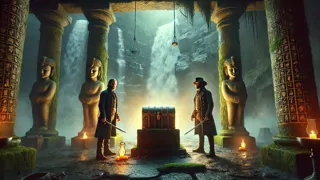Introduction
Captain Elias Ashford stood high on the quarterdeck of the Crimson Frigate, the North Atlantic wind lashing his dark coat and whipping his silvered hair back from a broad forehead. Below him, the crew strained at rope and spar, voices raised in a practiced chorus of commands and counter-commands. Far on the horizon, the jagged silhouette of a forgotten island crept into view, shrouded in mist and mystery like some phantom out of sailors’ tales. Weeks earlier, Ashford had come into possession of a battered sea chart, its corners singed by flame, its routes etched in cryptic ink. Rumor spoke of a hoard so vast that kingdoms would tremble—but the map’s warnings spoke equally of betrayals that had claimed whole crews. As seagulls screamed overhead, Ashford’s steady gaze surveyed his own crew—some eager, some fearful, and a few whose glances flickered with darker intent. In the lantern’s glow below decks, half-whispered plots had already begun to take form: a promise of gold to be claimed by those bold enough to rise against their captain. The ocean stretched wide in every direction, and with it the unspoken truth that only one would leave this voyage victorious. Somewhere beyond the churned waves lay the isle of hidden riches, and Ashford knew the crossing into legend would demand more than courage—it would test the very soul of every man who sailed with him.
The Map and the Mutiny
First light revealed the tattered edge of the parchment spread across the main hatch. Every brush of wind threatened to carry away another whispered secret from the map’s faded ink. Ashford’s first mate, Rowan Hale, traced a trembling finger along a line marked “Heart’s Blood Channel,” voice low with awe. Below, in the cramped hold, murmurs rose like the tide: promises of gold, curses for those who would stand in their way. By midday, the uneasy alliance between Ashford and his men began to fracture. Lieutenant Briggs, once a stalwart supporter, took to glaring down the length of the fo’c’sle, muttering of a captain too soft to seize what destiny had offered them. Over salted stew and stale bread, alliances were forged in shadowed corners: seamen who felt betrayed by Ashford’s cautious course now eyeing the chart as if it were a key to usurpation.

That afternoon, a silver lamp swung low in the captain’s cabin. By its flicker, Briggs confronted Ashford with an ultimatum: alter course and sail east to the isle under a new banner, or face the verdict of men who felt cheated. Ashford’s jaw set in a line of iron. He spoke of honor, of reputation, of the promise made to his motley crew that they would share not only the gold but his own share of danger. Briggs answered with steel—he lunged, blade drawn, only to be repelled by the captain’s deft parry. The blade caught in the ribbon of Ashford’s coat, ripping cloth but sparing flesh. Below decks, the tramp of boots and the clank of steel drew a cluster of mutineers—oil-dark eyes lit by the ambition of easy wealth.
Chaos roiled on the quarterdeck as Ashford’s loyalists met the uprising head-on. Lanterns tipped; curses echoed against wood and rope. The crimson sail above billowed like a wounded creature as sailors grappled in desperate half-light. In the melee, Ashford found Briggs at the rail—a duel of wills beneath the soaring yardarm. Sparks danced where their blades met. With a final twist, Ashford disarmed Briggs, sending the mutineer’s cutlass tumbling into the restless sea. The last conspirators fled into the hold, leaving only the captain’s breath and the taste of salt and sweat in the night air.
By dawn, the Crimson Frigate sailed true to the chart’s course. Briggs and his cohort were confined to the brig, distrust substituting for the old camaraderie. Still, only a handful had opposed Ashford openly; the rest had watched with silent calculation. The crew’s loyalty was forged anew—so fragile it might snap with the next gale. Above, gulls wheeled against a pale sky, as if heralding the trials that lay ahead on the island’s mysterious shore.
Trials on the Forbidden Isle
Ashford’s first sight of the island came at sunrise: a craggy silhouette crowned with mist, half-hidden by foaming breakers. A reef enmeshed in emerald waters forced the Crimson Frigate to anchor offshore, far too close for comfort under unseen guile. The crew rowed against the rising tide in battered longboats, oars slicing water like cleavers, hearts pounding at each thunderous crash of surf. When boot finally met sand, the landing party found themselves on a narrow spit of shell and shale, rimmed by twisted pines and the scent of salt and damp earth.

Inland, the forest loomed as a living labyrinth. Every leaf dripped with moisture; every trunk held the shape of a cloaked sentinel. Vines snagged jacket and belt, roots tripped the unwary. Somewhere beyond the dense canopy, the chart promised an ancient temple carved by unknown architects, the shrine where the buried trove lay concealed. Each step deeper into the undergrowth revealed more warnings: half-buried stones etched with cryptic glyphs, rusted spikes jutting like the broken ribs of sea monsters, and the distant cry of an unseen creature. The crew’s bravado frayed as shadows lengthened. Thatch-roof huts, now roofless, stood in eerie silence—abandoned outposts once used by original treasure hunters who had vanished without trace.
By afternoon, the first test arrived: a chasm cleft the ground, spanned by a single beam of fallen timber. Beneath, black water roiled in an underground pool. One false step meant instant doom. Hale volunteered first, pressing his boot onto the beam, balancing blades drawn. Halfway across, timber groaned; Hale froze, pulse thunderous in his ears. Ashford called out instructions in a calm voice, guiding the man across. When they regrouped, each knew the price of fear and the value of steady resolve.
Night fell under the forest canopy, a dome of whispering leaves pierced by glowing fireflies. The crew gathered around dim lanterns, sharing rations and stories of ghosts said to haunt the island’s heart. Briggs lingered apart, chains rattling, his eyes flickered with both envy and grudging respect. Even mutineers felt the ancient magic in the air: a promise of gold and a threat of death. Starlight filtered through branches, guiding them deeper toward the hidden shrine. Somewhere in the darkness, beyond vine and ravine, lay the entrance to their destiny—if any of them could claim it.
The Final Confrontation
The temple entrance yawned like a hungry maw beneath a cascading waterfall that thundered into a stone basin. Mist pooled at their feet, and the roar drowned every whisper. Ancient pillars carved with unknown symbols rose on either side, half-swallowed by creeping moss. Ashford led the way into the damp cavern, oil lamps flickering against carved walls. Every footstep echoed like a drumbeat in a sacred crypt.

Briggs and a few hardened sailors brought up the rear, chains clinking, eyes locked on Ashford’s steady gaze. In the torchlight, gold dust gleamed in crevices—proof that fortune lay close. Following the map’s signs, they descended stone stairs that spiraled down beneath the falls, each turn shaking loose pebbles and the echo of long-forgotten warnings. The air grew cooler; moisture dripped from archways into shallow pools where the crew’s reflection danced in lamplight.
At the temple’s heart, a vast chamber opened: pillars stretched into darkness, and at its center stood a stone pedestal bearing a rust-stained chest. As Ashford stepped forward, Briggs sprang from the shadows, blade drawn and eyes blazing. “The treasure will be mine,” he snarled. The other mutineers hemmed Ashford in, steel reflecting lamplight. Ashford’s back pressed against a pillar, heart hammering, but he spoke calmly: “You can take the chest—but once the echo of your greed rings here, this place claims its due.”
A fierce battle ensued beneath the waterfall’s relentless roar. Sparks flew as cutlass met cutlass. Ashford’s loyal crew surged forward, desperate to tip the balance. Briggs and Ashford clashed in a final duel around the pedestal. Metal rang on metal; droplets of spray caught in their blades. With a deft twist, Ashford disarmed Briggs, sending the pirate tumbling into a shallow pool where he lay stunned. Silence fell, broken only by the waterfall’s thunder. Gathering his breath, Ashford reached for the chest. As he lifted the lid, a golden glow bathed the chamber, illuminating every face in humble wonder and awe. The treasure was real—far more splendid than rumor had promised—but the real prize was the unity forged in fire and the courage that had delivered them to this moment.
Conclusion
As dawn crested above the island’s cliffs, the Crimson Frigate’s boats bobbed gently at the shoreline, laden with chests of gleaming coins, jeweled goblets, and ancient relics that had slumbered for centuries beneath the earth. Captain Elias Ashford stood at the stern of the longboat, the weight of the past voyage in his bones and the taste of salt forever on his tongue. His crew, once fractured by greed and fear, now stood side by side, their laughter rising over the water like a reclaimed treasure in itself. Even Lieutenant Briggs, humbled by defeat and by the lessons carved into every stone of the island, nodded in respect as Ashford offered him a place among the survivors. As the Crimson Frigate cut its wake through the glassy sea, the mist lifted from the isle behind them, revealing a land washed clean by storm and legend. It would become another whispered tale among sailors—a cruel challenge to greedy hearts, a test of courage that few would dare repeat. But for Ashford and his company, the true bounty lay in the bonds forged by steel and storm, and in the promise that, no matter how hidden, courage would always chart the course to freedom and fortune.

















